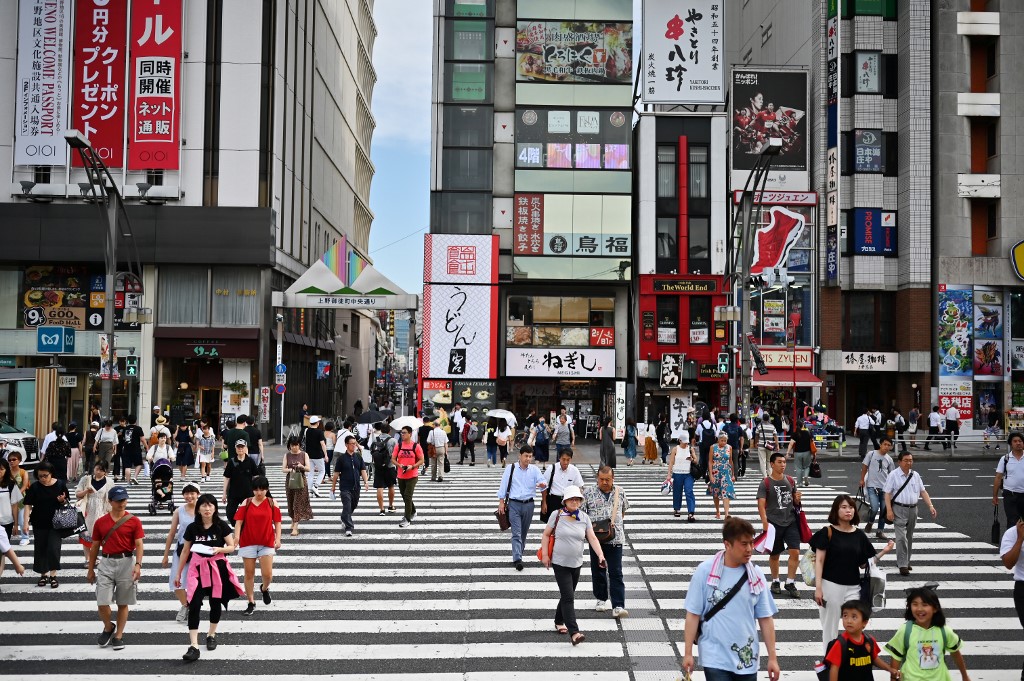Japan said Thursday it has granted its first permit for a South Korea-bound shipment of chemicals to produce high-tech materials under Tokyo's new export requirement that has increased tensions with Seoul.

Pedestrians cross a street in Tokyo's Ueno district on August 8, 2019. (Photo: AFP)
Trade Minister Hiroshige Seko made a rare announcement of the approval, saying that officials determined that the transaction raised no security concerns. The move is apparently meant to calm South Korean anger over Tokyo's export curbs and show there is no trade ban in place.
Japan imposed stricter controls on three key materials — fluorinated polyimides, photo resists and hydrogen fluoride — that are used mainly by South Korea's semiconductor industry as of July 4. The rules also downgrade South Korea's trade status beginning later this month.
Japanese chemical manufacturers have expressed concerns that case-by-case inspections may prolong the approval process and hold up production for their customers.
The first approval came after about a month, faster than the standard 90 days.
"The permit merely demonstrates that export licensing by the Japanese government is not arbitrary, and is granted to any legitimate transactions that pass strict inspections," Seko told reporters. "The step we took recently is not an export ban."
South Korean President Moon Jae-in remained cautious while expressing hope the impact of Japan's measures won't be as severe as Seoul had feared.
"Our government has planned for a worst-case situation since Japan converted its export approvals of the three materials to a case-by-case basis and has been preparing and announcing both short-term and long-term measures," he said.
"Of course, Japan may not proceed with export restrictions and there might not be any actual damage caused (to South Korean companies). But what hasn't changed is that uncertainty is still alive."
Late Thursday, more than 100 people gathered outside the Japanese prime minister's residence in Tokyo to urge the government to reverse the downgrading of South Korea's trade status and to apologize for wartime atrocities in an effort fix rapidly souring relations.
Holding up signs that said "No Abe," the protesters, which included Christian groups and pacifists, said they feared for regional peace and stressed Japan has failed to fully apologize and compensate victims for its 1910-1945 colonialization of the Korean Peninsula.
The Japanese government position is that all compensation issues are settled.
Nahoko Hishiyama, one of the protesters, said the hostility between the governments is in contrast to the healthy exchanges between their people, with many Japanese enjoying Korean pop music and cosmetics.
"We must truly repent our past," she said.
Sungjae Kim, a minister and member of the National Christian Council in Japan, said an exhibit in Japan that included a statue representing a wartime Korean sex slave had received threats, when Japanese should have welcomed the exhibit if they were truly sorry.
A suspect in the threats was arrested Thursday, said lawmaker Mizuho Fukushima, who was also at the protest. She expressed hope the exhibit would reopen.
Earlier this month, thousands of people protested outside the Japanese Embassy in Seoul, carrying signs that read "Boycott Japan," as well as "No Abe."
South Korea says Japan is using trade to retaliate for its court decisions ordering Japanese companies to compensate Korean forced laborers before and during World War II. Japanese officials deny the export controls constitute retaliation.


